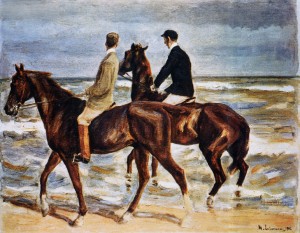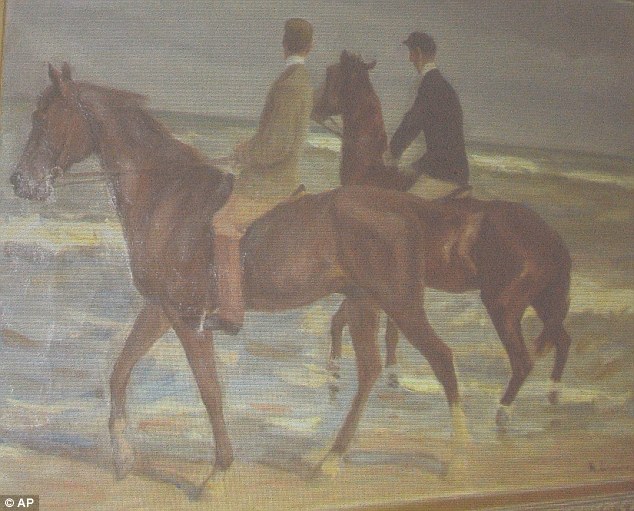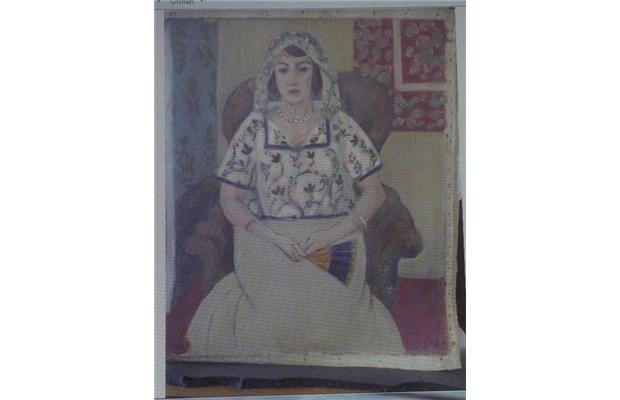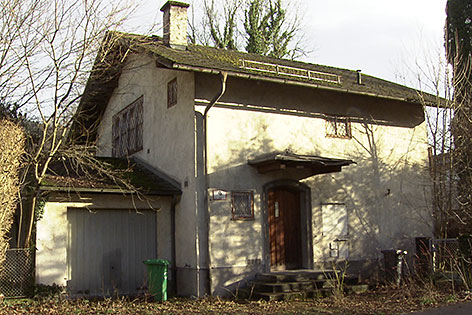To date, only one lawsuit has been filed in the United States related to the seizure from Cornelius Gurlitt’s apartment of some 1,280 works of art, a story that broke a year ago with the concern about the objects’ Nazi-looting connections via his father Hildebrand Gurlitt (the view here last winter was that the longer Germany failed to address the situation comprehensively, the more likely such U.S. litigation became). That lawsuit, brought by David Toren, seeks the return of Two Riders on the Beach (Zwei Ritter am Strand), by Max Liebermann. Germany and Bavaria moved to dismiss the case yesterday, which is particularly puzzling given that among the very few determinations made by the Gurlitt Task Force (in August), it is that the Liebermann should be returned. The cynical view is that they are looking to forestall future claims, but it is past time for the painting to be returned.
Bavaria and Germany Move to Dismiss Gurlitt Litigation, But Raise Questions About Why They Are Resisting a Lawsuit Over Painting that Task Force Recommended They Restitute to David Toren
Topics: Schwabinger Kunstfund, Hildebrand Gurlitt, Cornelius Gurlitt, Breslau, Max Liebermann, Germany, Silesia, Gurlitt Collection, Foreign Sovereign Immunities Act, bailment, Entartete Kunst, FSIA, Restitution, Bavaria, David Toren, Zwei Ritter am Meer, Free State of Bavaria, 28 U.S.C. § 1605(a)(2), Looted Art, World War II, Altmann v. Republic of Austria, Freistaat Bayern, Kunstmuseum Bern, Riders on the Beach, Federal Republic of Germany, Raubkunst, David Friedmann, Münchner Kunstfund
Are “Flight Goods” Different than Looted Art? Questions About Fair Value and Duress in Wartime Resonate After Recent Limbach Commission Decision
A conference was held last week at the Oskar Reinhart Museum in Winterthur, Switzerland, entitled “Fluchtgut: Geschichte, Recht und Moral” (Flight Goods: History, Law and Morality). The objective conference was described in its program as follows (my translation):
Topics: Expressionist, Esther Tisa Francini, Allied Collecting Points, Südkurier, Auctions, Florian Weiland, Oskar Reinhart Museum, Dresden, Karl Schmidt-Rotluff, Nazi-looted art, Robert Graetz, Buchholz Gallery, German Advisory Commission for the Return of Cultu, Winterthur, Entartete Kunst, Beratende Kommission, Curt Valentin, Restitution, Melissa Müller, Luzern, Clara Levy, Farm in Dangast, Fluchtgut: Geschichte Recht und Moral, Lucas Elmenhorst, Luxembourg, Looted Art, World War II, Lucerne, Switzerland, degenerate art, Handelsblatt, Lost Lives Lost Art Jewish Collectors Nazi Art The, Galerie Fischer, Imke Gielen, Washingtoner Prinzipien, Jutta Limbach, Washington Principles, Drei Grazien, Flight Goods: History Law and Morality, Lovis Corinth, Monika Tatzkow, Three Graces, Bavarian State Painting Collections, Raubkunst, Hans Posse, Limbach Commission, Bayerische Staatsgemäldesammlungen
Limbach Commission Rules Against Claimants to Restitution of “Three Graces” by Lovis Corinth in Unpersuasive Opinion
The German Advisory Commission for the Return of Cultural Property Seized as a Result of Nazi Persecution, Especially Jewish Property (Beratende Kommission) has issued its latest decision concerning allegedly Nazi-looted art in German museums. For the second case in a row after the widely (and wisely) derided opinion not to restitute the Welfenschatz or Guelph Treasure at the Stiftung Preussischer Kulturbesitz in Berlin, the commission (known for its presiding member, former German Supreme Constitutional Court judge Jutta Limbach) has recommended against restitution, this time over the claim by heirs of Clara Levy to The Three Graces (Drei Grazien) by Lovis Corinth (1902/1904). The decision (available only in German) is riddled with poor logic and basic historical errors. In short, while it may be that the painting was indeed delivered to Clara Levy’s daughter in the United States at Clark’s express instruction, that is far less clear than the commission states, and its decision further makes a number of assumptions about the circumstances of Jews in occupied or about-to-be occupied territories that undermine its credibility considerably.
Topics: Berlin, Else Bergmann, Schleifmühle, Hildebrand Gurlitt, Cornelius Gurlitt, Ludwig Levy, Fritz Levy, Rita Hubbard, Germany, Nazi-looted art, bill of lading, Especially Jewish Property, Buchholz Gallery, Madame Soler, German Advisory Commission for the Return of Cultu, San Francisco, Entartete Kunst, Beratende Kommission, Stiftung Preussischer Kulturbesitz, FSIA, Curt Valentin, expropriation exception”, Gurlitt, Restitution, Max Huggler, Mendelssohn-Bartholdy, Clara Levy, Sigfried Rosengart, Luxembourg, Henry Zacharias, Compagnie Generale Transatlantique Hol Lesquette, World War II, Foreign Sovereign Immunities, Pinakothek der Moderne, degenerate art, beschlagnahmte Kunst, Jutta Limbach, Kunstmuseum Bern, Drei Grazien, Pablo Picasso, Lovis Corinth, Museums, Three Graces, Bavarian State Painting Collections, Federal Republic of Germany, Paula Levy, Kurt Buchholz, Welfenschatz, Limbach Commission, New York, Bayerische Staatsgemäldesammlungen
Gurlitt Task Force Issues Second Public Recommendation, Urges Restitution of Liebermann painting to David Toren—Lawsuit Not Over Yet
Eileen Kinsella at ArtNet news reported today that the Gurlitt Taskforce has recommended the restitution of the Max Liebermann painting Riders on the Beach (Reiter am Strand) to David Toren, a New York man who left Germany at age 14 in 1939. His great uncle David Friedmann lived in Breslau, the capital of Silesia (now part of Poland, known as Wrocław). The Nazis catalogued and seized Friedmann’s art collection in 1939-40, and the Liebermann painting appears on those records. It was later found among those 1,280 objects seized from Gurlitt a little over two years ago when he aroused suspicion returning from Switzerland with a large amount of cash.
Topics: Breslau, Eileen Kinsella, Wrocław, Gurlitt Task Force, Max Liebermann, Silesia, Nazi-looted art, Gurlitt Collection, Entartete Kunst, Reiter am Strand, August Matteis, Restitution, David Toren, 28 U.S.C. § 1605(a)(2), World War II, Switzerland, degenerate art, Poland, Altmann v. Republic of Austria, Kunstmuseum Bern, www.lostart.de, Berner Zeitung, Riders on the Beach, David Friedmann, ArtNet news
Curiouser and Curiouser: Still More Gurlitt Paintings Found, Nazi-Looting Connections Unknown
As if the Cornelius/Hildebrand Gurlitt saga needed any more complications as the world awaits the official decision by the Kunstmuseum Bern about whether to accept the appointment as Cornelius Gurlitt’s heir, even more artwork has apparently turned up. Der Spiegel, the Frankfurter Allgemeine Zeitung, and the Wall Street Journal have reported that one picture and several sculptures in the very apartment from which the original trove was seized more than two years ago. Among the sculptures are apparently a Degas and a Rodin. Nothing else seems known about the works or their ownership history, or whether they might be among works that Hildebrand Gurlitt sold or acquired as "degenerate" (side note: the Victoria and Albert Museum's copy of the Degenerate Art Action register is currently on display in New York at the Neue Galerie's exhibition of that title. While it is available online, it is most certainly worth a visit before the show ends).
Topics: Frankfurter Allgemeine Zeitung, Victoria and Albert Museum, Rodin, Cornelius Gurlitt, Schwabinger Kunstfund. Kunstfund München, Gurlitt Task Force, Fall Gurlitt, Gurlitt Collection, Degas, Hildebrand Gurlit, Entartete Kunst, Gurlitt, Restitution, Bavaria, Neue Galerie, Der Spiegel, Wall Street Journal, World War II, Degenerate Art Action, degenerate art, Kunstmuseum Bern, www.lostart.de, Nazi art, Raubkunst
Gurlitt Task Force Makes First Determination that Matisse "Seated Woman" Was Stolen From Rosenbergs; Questions Remain About What Happens Next
The Gurlitt Task Force has issued its first public conclusion about the status of work amongst the collection found in Cornelius Gurlitt's apartment. Chair Ingebeborg Berggreen-Merkel issued a statement today that (my translation):
Topics: Schwabinger Kunstfund, Hildebrand Gurlitt, Cornelius Gurlitt, Gurlitt Task Force, Nazi-looted art, Gurlitt Collection, Entartete Kunst, Munich art trove, Anne Sinclair, NS Raubkunst, Restitution, World War II, Kunstmuseum Bern, Washington Principles, Sitzende Frau, Kunstfund München, Henri Matisse, Paul Rosenberg
The Next Gurlitt? Records from Weinmüller Auction House Made Available Online
Among the many legacies of the Gurlitt saga is a renewed focus on the importance of Nazi-approved art dealers like Karl Haberstock to the expropriation, outlawing, and re-sale of art either owned by Jewish collectors or which was thematically disapproved by the Nazi state. Relatedly, it has served as a reminder of the often cursory review that many of these men received after the war, and the acceptance of their proffered explanations, like those of Hildebrand Gurlitt, that “everything was destroyed in a bombing attack.” Now, the German Central Institute for Art history is set to make public the records of Adolf Weinmüller and his eponymous auction house (later renamed Neumeister).
Topics: Meike Hopp, Schwabinger Kunstfund, Was einmal war, Hildebrand Gurlitt, Cornelius Gurlitt, Zentralinstitut für Kunstgeschichte, Lost Art Database, Schwabinger Taskforce, Gurlitt Task Force, Nazi-looted art, Gurlitt Collection, Karl Haberstock, Kende, Entartete Kunst, Munich, Restitution, Wien, World War II, degenerate art, www.lostart.de, München, Adolf Weinmüller, Neumeister Auction House, Aryanized, Sophie Lille, Unser Wien ‘Arisierung’ auf Österreich, Nazi Raubkunst, Vienna, Tina Walzer
Cornelius Gurlitt Attorney References “Only Eight Works” in Relation to Nazi Persecution, Likely More of an Update than Assertion of Ownership
The attorney for the recently deceased Cornelius Gurlitt, Stephan Edel, told Der Spiegel today that “At the present time, only eight works must be returned from the collection as a result of Nazi persecution,” (my translation). Edel went on to say “Whether further works will follow, must await the results of the ongoing research.”
Topics: Schwabinger Kunstfund, Hildebrand Gurlitt, Cornelius Gurlitt, www.Gurlitt.Info, Wolfgang Seybold, German museums, Nazi-looted art, Gurlitt Collection, Entartete Kunst, will contest, Curt Valentin, Restitution, Der Spiegel, World War II, Bunte, degenerate art, Kunstmuseum Bern, Nazi Raubkunst, Kunstfund München
Gurlitt Bequest to Kunstmuseum Bern: German Language Analysis Roundup
Discussion continues to swirl about how the passing of Cornelius Gurlitt this week will affect the review and possible return of the paintings found in his Munich apartment, and those in Austria. Not surprisingly, the majority of reflections on the news that Gurlitt appointed the Kunstmuseum in Bern, Swizterland as his sole heir are in German, Austrian, and Swiss publications. Here are is my roundup of the latest reports:
Topics: Neue Zürchner Zeitung, Schwabinger Kunstfund, Ingeborg Bergreen-Merkel, Stephan Holzinger, Bad Aussee, Cornelius Gurlitt, Monopol, Gurlitt Task Force, Germany, will, Nazi-looted art, Gurlitt Collection, Matthias Frehner, Entartete Kunst, Salzburg, Restitution, ORF, World War II, Switzerland, Süddeutsche Zeitung, heir, Austria, Kunstmuseum Bern, Washington Principles, Nazi Raubkunst, validity
Gurlitt Names Kunstmuseum Bern as Sole Heir. Will the Museum Want Everything that Comes with That?
Following confirmation by his attorney that Cornelius Gurlitt had left a will, it was further revealed yesterday that Gurlitt had not merely left his collection of paintings with substantial Nazi-looting questions to a museum outside Germany, but that he had named the Kunstmuseum Bern itself as his sole heir. The Kunstmuseum is the oldest museum in Switzerland, with more than 50,000 objects that include works by Vincent van Gogh, Franz Marc and Henri Matisse. The museum responded by releasing a statement that:
Topics: Schwabinger Kunstfund, Bad Aussee, Cornelius Gurlitt, Gurlitt Task Force, Germany, Nazi-looted art, Gurlitt Collection, Vincent Van Gogh, Entartete Kunst, Salzburg, Restitution, World War II, Switzerland, Austria, Franz Marc, Kunstmuseum Bern, Museums, Nazi Raubkunst, Henri Matisse







